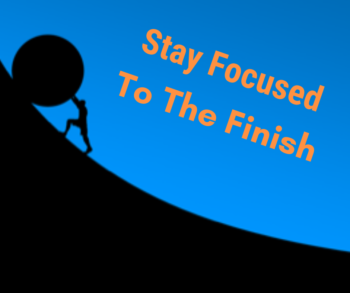Focus And Finish Your Resolutions
I decided that my theme for this year is “F2 -” which stands for Focus and Finish. I have a few projects that I have been working on for some time. They need to get off my desk so that I have room for the new projects which are coming in. Here is how I tackled this challenge.
Fighting Resistance
The work of crafting and producing a speech worthy of your audience’s attention is an art. Yes, there are fundamental components surrounding the craft of speech-writing and development that are learned skills: crafting stories, finding the supporting evidence for your point of view, sequencing your content so that it flows, and delivering your material so that it captivates your listeners. The art of speech-crafting is developed over time, honed through trial and error.
Wanting to produce new material and finding the right audience to serve is not easy. I know – I’ve been there. You’ve probably been there, too. The resistance to put in the work is strong, even though you have an idea that is seeking to be developed. The will to follow through with this commitment feels shallow.
 These first few weeks of January are the kind of moments where I pull out Steven Pressfield’s best-selling classic, “The War of Art”, from my bookshelf. Pressfield writes, “Resistance cannot be seen, touched, heard, or smelled. But it can be felt. We experience it as an energy field radiating from a work-in-potential. It’s a repelling force. It’s negative. Its aim is to shove us away, distract us, prevent us from doing our work.”
These first few weeks of January are the kind of moments where I pull out Steven Pressfield’s best-selling classic, “The War of Art”, from my bookshelf. Pressfield writes, “Resistance cannot be seen, touched, heard, or smelled. But it can be felt. We experience it as an energy field radiating from a work-in-potential. It’s a repelling force. It’s negative. Its aim is to shove us away, distract us, prevent us from doing our work.”
Striving to set better routines and practices into play, I decided to take a different approach – one where I could adopt concepts from behavior design, and make doing the work less of a struggle. The way I structured my new routine was based on BJ Fogg’s work and book, “Tiny Habits.” Here are the tenets of successfully beating resistance and adopting a new routine:
1. Mindset. Knowing that I wanted to change was not enough. I had to want the change, and not give in to the “should” change mindset. Coming back to my “why I wanted to develop a new speech based on newly published research that aligned with my topic” was motivation for wanting to change how I worked.
2. Anchors. Anchors are already existing behaviors that you can anchor new behaviors on. I already have the habit of journaling in the morning, so I now consider journaling as my “anchor” and warm-up to get me into my development mode.
3. Tiny. New behaviors need to start out very tiny in order to beat resistance. (Initially, I started working in just 10-minute segments. Over time, I found that 10-minute segment expanding into 20-minute segments.) I found that consistency matters. Ten to twenty minutes of focused time daily was very helpful in getting past resistance and gathering inertia – especially when starting on a new project.
4. Celebrate. The positive self-talk (I did it!) and that single fist-pump seemed to have instilled a sense of accomplishment. Yes, I was making progress towards completing this speech project.
I will use this same process for rehearsing and for finding the right audiences to deliver this new message. So far, the Focus and Finish theme is working. Do you have a theme or a process that enables you to get more focused to finish what you’ve set out to accomplish?
